
Lesson 5 The Crayfish (Crustacean) C.S.W.D
Most adult crayfish are about 7.5 cm (3 inches) long. Among the smallest is the 2.5-cm-long Cambarellus diminutus of the southeastern United States.Among the largest is Astacopsis gouldi of Tasmania, which may reach 40 cm in length and weigh about 3.5 kg (8 pounds).. Crayfish, common in streams and lakes, often conceal themselves under rocks or logs.
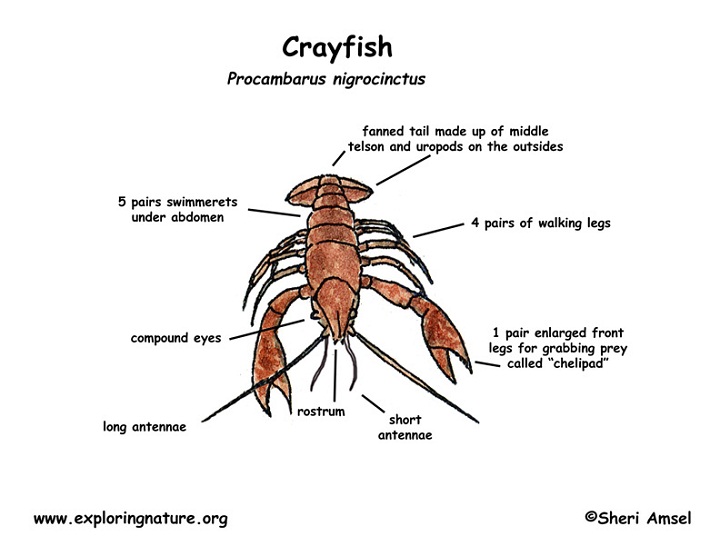
Crayfish Diagrams 101 Diagrams
Social Studies. World Languages. This video details the external anatomy of a crayfish and compares it to other arthropods.
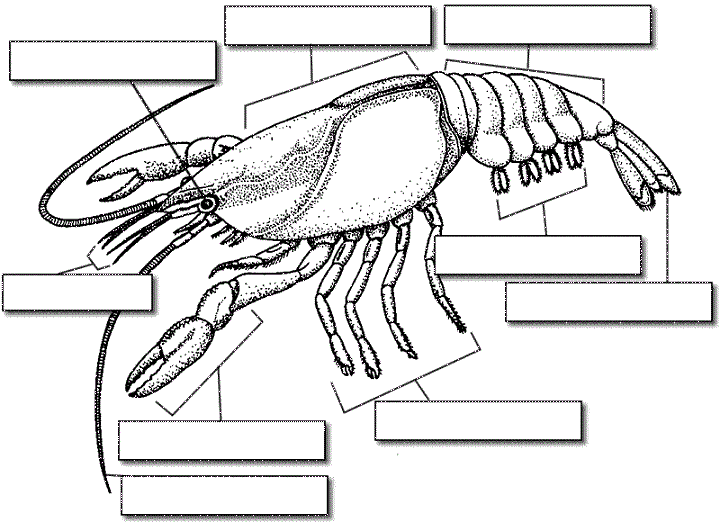
Crayfish External Anatomy
A quick guide to crayfish anatomy In using keys to identify crayfish (or in describing the differences between male and female crayfish ), it can quickly become a confusing word soup of technical terms. This section will help you wade through the jargon-y maze of words used to describe the anatomy of crayfish. (A) coloration (B) areola width
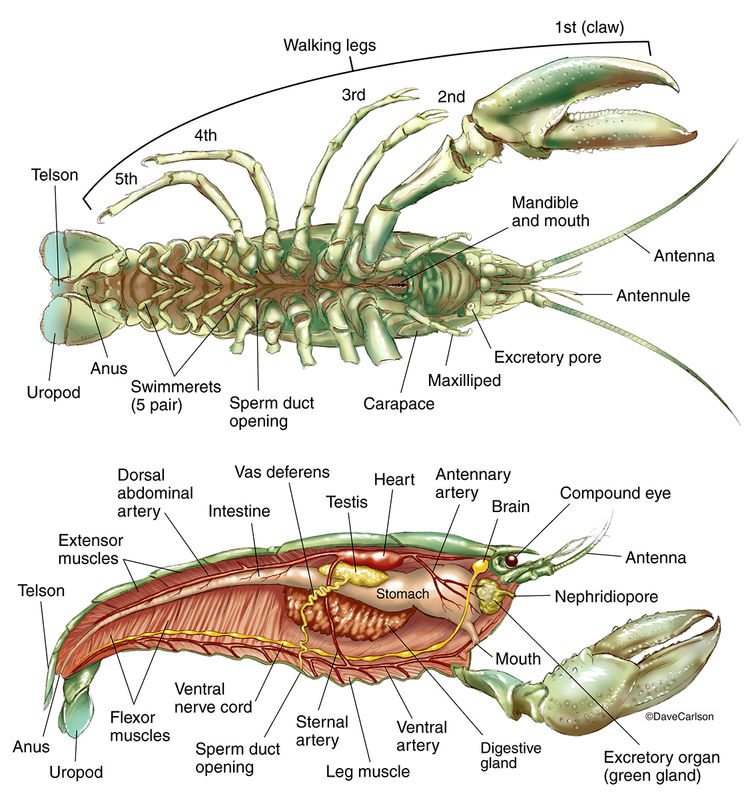
Zoology Carlson Stock Art
The crayfish belongs to the Phylum Arthropoda, which includes organisms having an exoskeleton, jointed appendages, and segmented bodies. The word "Arthropoda" literally means "joint foot." The anatomy of this animal can be studied as external and internal anatomies. External Anatomy of Crayfish Crayfish External Anatomy
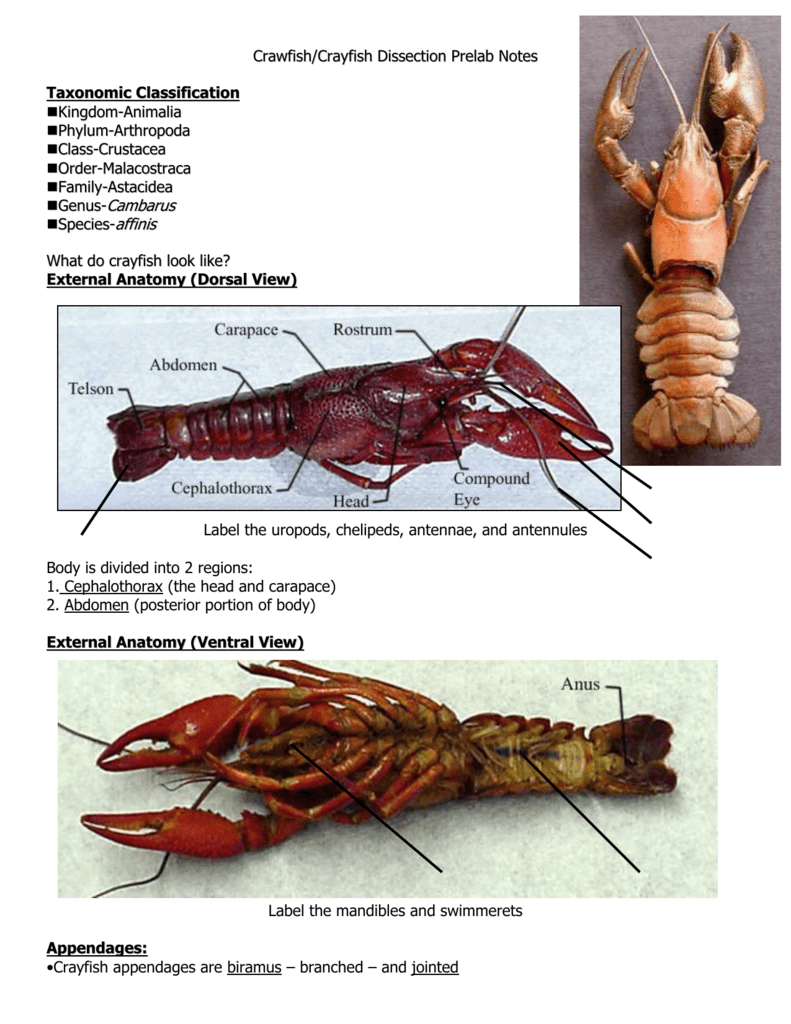
Internal Anatomy Crayfish Anatomy Book
Internal anatomy of a crayfish: edible freshwater crustacean, with pincers on the two forelegs. Encephalon: site of the mental functions of a crayfish. Stomach: part of the digestive tract between the esophagus and the intestine. Heart: blood-pumping organ of the crayfish. Gonad: sex gland of a crayfish.

Crayfish Diagrams Printable 101 Diagrams
Crayfish are arthropods, which are the most diverse and abundant animals on earth. There are more species of arthropods than all animals combined. Arthropod characteristics: Jointed appendages - bend to move in specific directions and specialized for specific jobs

Crayfish Internal Anatomy Shrimp and Snail Breeder
Answers EnchantedLearning.com Label Crayfish External Anatomy Crayfish Printout More on Crustaceans Read the definitions below, then label the crayfish diagram. Abdomen - The abdomen is the segmented tail area. The swimmerets, telson, and uropods are attached to the abdomen. Carapace - The protective shell (exoskeleton) of the cephalothorax.

Dorsal view of generalized male crayfish (Redrawn from Hobbs 1976
Arachnids breathe via book lungs. More information on arachnids will follow in a subsequent lab. Subphylum Crustacea ( crusta = crust, rind) includes crayfish and lobsters, crabs, pillbugs, and several other groups. They have gills, thus terrestrial pillbugs need to maintain a 100% humidity environment around their gills to be able to "breathe."

Crayfish Diagrams 101 Diagrams
The Anatomy of a Crayfish. Let's take a closer look at the anatomy of a crayfish. These creatures have a segmented body that is divided into two main regions: the cephalothorax and the abdomen. The cephalothorax contains the head, which includes the eyes, antennae, and mouthparts, as well as the thorax, which houses the walking legs and small.

Labeled Crayfish Diagram
As shown in the diagram below, the crayfish body is divided into two main parts: cephalothorax; abdomen; The cephalothorax consists of the cephalic (or head region) and the thoracic region. The rostrum is the most anterior part of the cephalic region of the cephalothorax and will form what is commonly known as the "brow ridge". The part of the exoskeleton that covers the cephalothorax is.

crayfish. arthropods arthropods activity Crayfish, Biology, Arthropods
Objectives: Students will be able to identify types of crustaceans and provide examples. Students will be able to describe the basic biology of aquacultured crustaceans. Students will be able to identify key anatomical features of common crustacean species.

Crayfish Internal Anatomy Shrimp and Snail Breeder
Abdomen The abdomen is flexible and the segmentation is visible here. The appendages of the crayfish attach to both the cephalothorax and the abdomen. The appendages that attach to the thorax are called WALKING LEGS and you can see how they are jointed in the figure below.

Crayfish Dissection C1W7 Classical Conversations Cycle 1 Classical
In this Biology lab, we will take a close look at the external and internal anatomy of a freshwater aquatic invertebrate—the crayfish. As we study the anatom.

Solved Subphylum Crustacea Crayfish dissection Obtain a
The External Anatomy of the Crayfish . Google Doc. Crayfish are freshwater crustaceans that belong to the Phylum Arthropoda (subphylum Crustacea). They are also known as crawfish, crawdads, and mudbugs. They can be found in freshwater streams or even in muddy ditches.. Label the diagram as you locate structures using the abbreviations. 8.

Crayfish External Anatomy Shrimp and Snail Breeder
1. The cephalothorax The cephalothorax (cephalic+ thoracic) consists of the cephalic (or head) region and the thoracic (or chest) region. In its turn, the chest also consists of 3 segments that can be seen only from the ventral side of the crayfish where each segment contains a pair of appendages that are called walking legs.
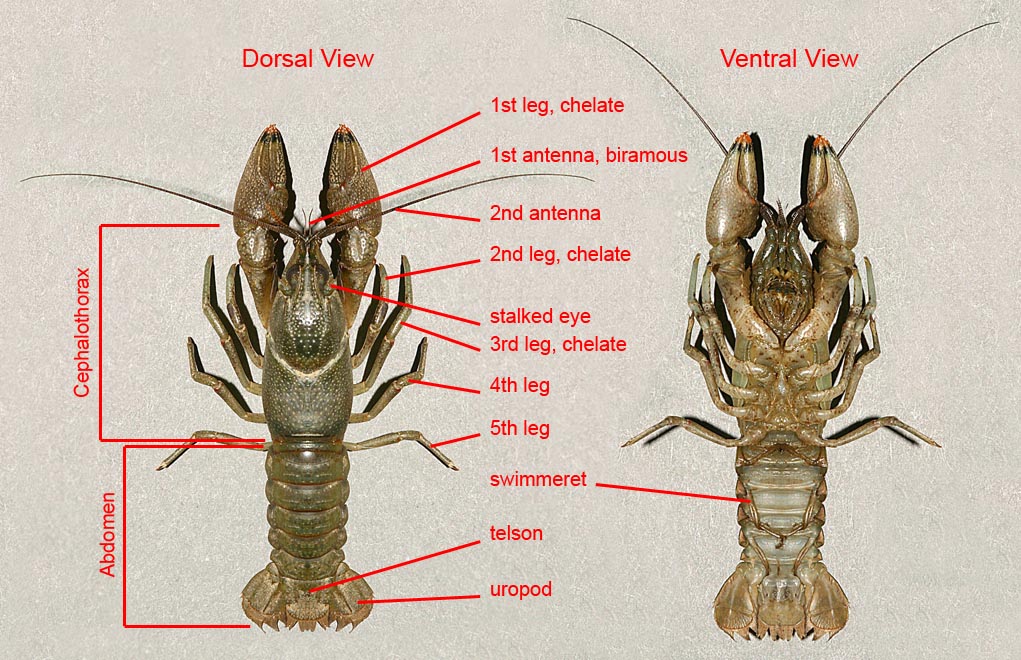
Crawdads in NC Lucky Sci
The Body. The body of the crayfish consists of a fused head and thorax: the cephalothorax. The cephalothorax is covered by a thick armor called a carapace. Extending from the carapace is a pointy structure called the rostrum. Locate the cephalothorax and rostrum. The abdomen of the crayfish is segmented and flexible.